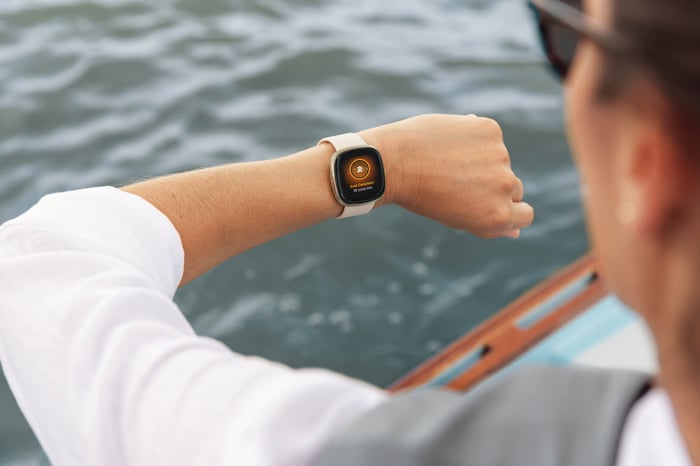It's now been nearly a year since Alphabet (GOOG 0.74%) (GOOGL 0.55%) subsidiary announced its proposed acquisition of Fitbit (FIT) in a $2.1 billion deal that values the wearables maker at $7.35 per share. During that time, concerns have mounted that Google might use Fitbit's sensitive health data for ad targeting, undermining user privacy and potentially undermining competition.
Regulators, particularly in the European Union where privacy protections are stronger, have been seeking various concessions and guarantees before approving the deal. Google might have just clinched the EU's blessings.

Fitbit Sense. Image source: Fitbit.
Approaching approval
Reuters reports that regulators are preparing to approve the proposed purchase following a recent set of concessions that Google has agreed to. The search tech juggernaut has already formally committed to not using Fitbit data for advertising purposes; the company had previously said as much in the initial announcement but has now made that vow more legally binding.
Antitrust regulators across the pond have also been investigating other areas of potential concern, including the possibility that Google could hinder interoperability of Fitbit devices with competing digital platforms or operating systems. Google has addressed now addressed that issue as well, according to the report.
"We're also formalizing our long-standing commitment to supporting other wearable manufacturers on Android and to continue to allow Fitbit users to connect to third party services via APIs (application programming interfaces) if they want to," Google told the outlet in a statement.
It appears that all of the concessions will be sufficient to get EU regulators to sign off on the controversial acquisition, which could reshape the competitive landscape in the wearables market. U.S. regulators have not yet approved the deal, but the acquisition isn't expected to face as much pushback stateside.
Joining forces against Apple
Apple (AAPL 1.27%) currently dominates the wearables market in both of the most prominent categories -- hearables and watches. The AirPods lineup combined with Apple Watch have propelled the Cupertino company to a comfortable leadership position in the relatively nascent space.
Smartwatches have started cannibalizing basic fitness trackers in recent years, historically the core of Fitbit's hardware business. Fitbit has pivoted to smartwatches with varying levels of success, and is now pushing upmarket with the Fitbit Sense in its latest bid to challenge Apple Watch directly. Fitbit has seen its total unit volumes steadily decline amid its transition to smartwatches, mostly as fitness trackers fall by the wayside in developed markets.
Apple was the top wearables vendor in the second quarter with 34% market share, according to IDC. The No. 2 player, China's Huawei, trailed by a significant margin with less than 13% share. Fitbit came in No. 5 with just 3% of the market. Google's Wear OS has long been irrelevant as third-party manufacturers focus on proprietary platforms.
Google is betting $2.1 billion that by scooping up the No. 5 wearables maker will suddenly make it relevant in wearables again. Investors cheered the progress towards approval, sending shares up by 6% yesterday.




